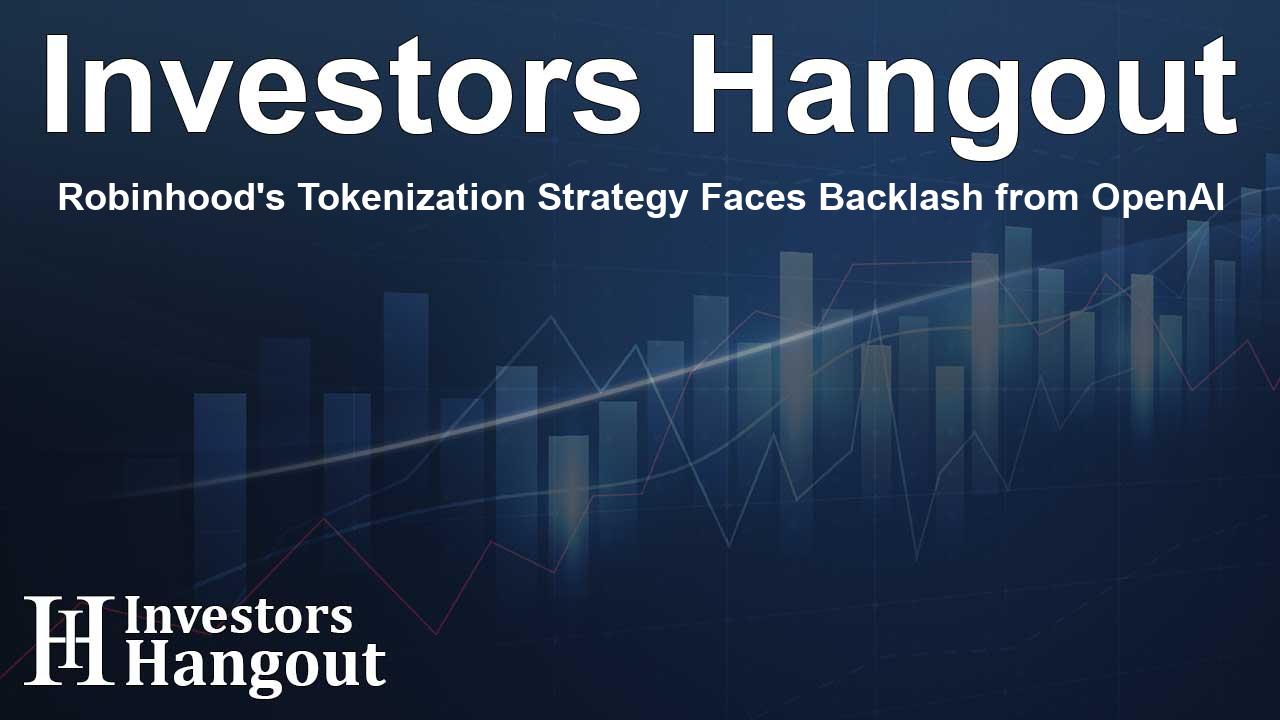Robinhood's Tokenization Strategy Faces Backlash from OpenAI

Robinhood's Controversial Launch of Tokenized Shares
Robinhood Markets (NASDAQ: HOOD) stirred the pot this week with the introduction of tokenized shares for key private companies such as OpenAI and SpaceX, aimed specifically at European Union users. However, this move was met with immediate backlash from OpenAI itself, leading to questions about the integrity of Robinhood's approach.
The AI technology firm quickly set the record straight, clarifying that the so-called "OpenAI tokens" are not real equity shares and were launched without their consent. This situation underscores a growing friction between crypto platforms trying to broaden access to private investment opportunities and the companies whose shares are being tokenized without formal agreements.
Details of Robinhood's Tokenization Initiative
During a recent announcement from Cannes, Robinhood's CEO Vlad Tenev outlined an ambitious plan to provide tokenized stock offerings to EU users. This collection included over 200 firms, particularly focusing on high-profile players like OpenAI and SpaceX.
This initiative was part of a larger strategy showcasing additional features, including perpetuals trading, staking solutions, and a new blockchain network built on Arbitrum. To incentivize participation, Robinhood offered qualifying EU users 5 euros worth of tokens from OpenAI and SpaceX for those who signed up by a specific deadline, taking advantage of the EU's more relaxed rules regarding investor protection.
In defense of its new offerings, Robinhood stated that these tokens should be viewed as vehicles for "indirect exposure to private markets," emphasizing their ownership in a special purpose vehicle (SPV) that facilitates these transactions.
According to Robinhood, the stock tokens operate as derivatives on a blockchain, tracking the price movements of the underlying companies. However, investors must be aware that purchasing these tokens does not equate to holding any genuine stock shares, thereby offering no traditional shareholder rights.
OpenAI's Firm Rejection of Association
The reaction from OpenAI was both quick and definitive. They took to social media to clarify that the so-called "OpenAI tokens" do not represent actual equity in the company. They reiterated that no partnership with Robinhood existed regarding this offering, distancing themselves from any implication of endorsement.
In their statement, OpenAI pointed out that any transfer of their equity must have explicit authorization from them, which was not provided for the tokenization effort undertaken by Robinhood. They cautioned potential investors to approach the situation with care due to the unauthorized nature of the offering, which could expose them to significant risks.
This backlash had an immediate effect on Robinhood's stock, with HOOD shares experiencing a decline following OpenAI's clear dismissal of the partnership. Recently, Robinhood stocks were seen trading at $94.09, marking a decrease of 3.97% from the preceding close, reflecting the market's concerns about this fallout.
Despite this downturn, Robinhood has been able to achieve impressive growth throughout the year, showing a 152.52% increase, particularly against the broader market with the S&P 500 showing a modest 6.62% return.
The company's market capitalization stands at around $83.03 billion, although market analysts have mixed opinions on future performance. Price targets fluctuate significantly, projecting estimates from a low of $43.00 to a high of $110.00, averaging out at around $73.98.
The Future of Tokenization in Financial Systems
The conflict between Robinhood and OpenAI serves as a pivotal example of the challenges facing tokenization efforts within the financial landscape. As platforms like Robinhood strive to innovate and diversify offerings, the need for transparent partnerships and ethical practices is becoming increasingly evident.
Investors are urged to stay informed about the rapidly evolving world of tokenized assets and be vigilant regarding the authenticity and legality of such offerings. In this environment of competition and innovation, understanding the boundaries and regulations governing financial transactions will become paramount.
Frequently Asked Questions
What are tokenized shares?
Tokenized shares represent a digital version of stocks or equity that allows investors to trade fractional ownership of an asset, providing access to markets that may otherwise be closed off.
How did OpenAI respond to Robinhood's token launch?
OpenAI publicly distanced itself from the token offering, clarifying they did not approve or endorse the creation of tokens representing their equity.
What impact did this controversy have on Robinhood's stock?
The immediate impact was a decline in Robinhood's stock price following OpenAI's statement, reflecting apprehension in the market regarding the credibility of their tokenization strategy.
Why is there concern over tokenization without company approval?
Tokenization of a company's equity without explicit consent can mislead investors about the nature of their ownership rights, potentially exposing them to financial risks.
What might the future hold for tokenized assets?
The future of tokenized assets relies heavily on establishing clear regulations, investor protections, and ethical partnerships within the financial industry to foster trust and growth.
About The Author
Contact Owen Jenkins privately here. Or send an email with ATTN: Owen Jenkins as the subject to contact@investorshangout.com.
About Investors Hangout
Investors Hangout is a leading online stock forum for financial discussion and learning, offering a wide range of free tools and resources. It draws in traders of all levels, who exchange market knowledge, investigate trading tactics, and keep an eye on industry developments in real time. Featuring financial articles, stock message boards, quotes, charts, company profiles, and live news updates. Through cooperative learning and a wealth of informational resources, it helps users from novices creating their first portfolios to experts honing their techniques. Join Investors Hangout today: https://investorshangout.com/
The content of this article is based on factual, publicly available information and does not represent legal, financial, or investment advice. Investors Hangout does not offer financial advice, and the author is not a licensed financial advisor. Consult a qualified advisor before making any financial or investment decisions based on this article. This article should not be considered advice to purchase, sell, or hold any securities or other investments. If any of the material provided here is inaccurate, please contact us for corrections.
